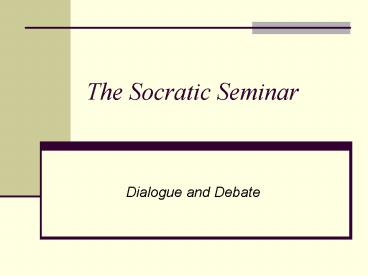The Socratic Seminar PowerPoint PPT Presentation
Title: The Socratic Seminar
1
The Socratic Seminar
- Dialogue and Debate
2
QUESTIONS, QUESTIONS, ETC.The Socratic
Seminar begins with a teacher's question, but is
grounded in the idea that students learn through
questioning themselves and coming up with their
own ideas.
3
Why use Socratic Seminars?
- They enhance critical thinking skills
- analysis of text
- synthesis of ideas
- evaluation of concepts
- inferential reasoning
- speaking and listening
4
Why use Socratic Seminars?
- They address writing skills
- Students can write about the ideas presented
- Students can evaluate the quality of the seminar
itself (participation, quality of comments,
insights, new ideas).
5
Socratic Seminar Is More Than a Classroom
Discussion
- It is objective-driven. Teachers should go into a
Socratic Seminar with a clear understanding of
what the student outcomes are. - It is content-driven. Student discussion should
revolve around a book, painting, poem, film clip,
scientific hypothesis, mathematical problem, etc.
6
What Do You Need for a Socratic Seminar?
- Time it should not be a 10 minutes and times
up activity - Space a room in which the participants in the
discussion sit in a circle instead of in rows - Guidance a teacher who is an observer/guider,
not the principal performer standing in front of
the group
7
The Teacher First Among Equals
- The Teachers Job Is
- Moderating
- Guiding
- Correcting
- Leading
- Arguing, like one more student!
- All must have the sense that they are
participating as equals, as is the case in a
genuine conversation.
8
But what about math?
- http//youtu.be/lGNqRmirT7Q
9
PLANNING
- FIRST Choose a text for INTEREST and COMPLEXITY
- SECOND Design questions that stimulate thought
and provide a good opening to the conversation - THIRD Be sure to teach background information
necessary for a rich discussion. (This helps
eliminate interruptions.) - FOURTH Prepare the room. Desks should be
arranged to provide an inner and outer circle
(unless it is a small class).
10
FIFTH Explain the Socratic Seminar and Give
Students the Rules
- It is their conversation. They can move in any
direction they would like, but they must frame
their comments/ideas in terms of the
text/content. - It is their conversation. They should direct
comments and questions to one another the
teacher is merely an observer. - It is a conversation. Encourage the students to
think before they talk, try to comment or add on
to what others have said, and listen respectfully
to others.
11
AND YOURE OFF TO THE RACES!
- Toss out the question - but, be prepared
- Students have learned to be passive, and this
activity can be risky for some students, so it
may take time for some groups to catch on. - The conversation is likely to have stops and
starts, but it is crucial that the teacher not
step in and try to rescue the conversation. - If the conversation goes dead, wait. Students
will find the silence unbearable before the
teacher does. Your silence also indicates your
level of commitment to the activity.
12
TEACHER BEHAVIOR
- Defer questions back to the students.
- Answer factual questions only if there is no way
around it. - Keep students from having side conversations.
- Ask students to cite support from the text if the
conversation begins to wander. - Invite specific students to participate.
- Keep conversations from becoming debate or
debasement of others. - Ask students to question their assumptions.
13
OTHER TECHNIQUES
- Manipulate the amount of participation.
- Those who have already participated must wait 5
minutes before speaking again. - Ask a disengaged scholar what theyre thinking.
- Use nonverbals to encourage participation/ gauge
focus. - Use the outer circle to your advantage.
- Have them summarize or comment on what they have
heard. - Ask them to re-introduce the points they thought
were especially good or prematurely dropped. - Have them monitor the inner circle for
conversation as well as for ideas.
14
DEBRIEF AND ASSESS
- Include an exit ticket that assesses student
mastery of the objective as well as how
successful the seminar was. - How does the text/problem/content relate to the
unit we just completed? - What is something new you learned through the
analysis/discussion? - What was an insightful comment one of your
classmates made? - How has your thinking changed about this topic?
- What went well during the seminar?
- What could we do better for the next seminar?
15
Video Clip
- Watch the following clip and think about the
level of engagement of scholars in this Socratic
Seminar - http//youtu.be/fp8eE_csQC0
- What was strong about this seminar?
- How could it be improved next time?
- Thanks, Mr. Lodato!
16
Demonstration
- 1. Read the article and mark it up.
- 2. Following the guidelines for student
participation, the inner circle will discuss the
text first and the outer circle will listen
attentively and take notes. - 3. When time is called, the inner and outer
circle will switch spots and responsibilities. - 4. Be prepared to give feedback and to share your
experiences with the whole group.
17
Debrief and Assess
- What went well in the demonstration seminar?
- What could be improved for the next seminar?
- How do you see incorporating this into your
classroom? - Do you have any questions/concerns about
implementation?

